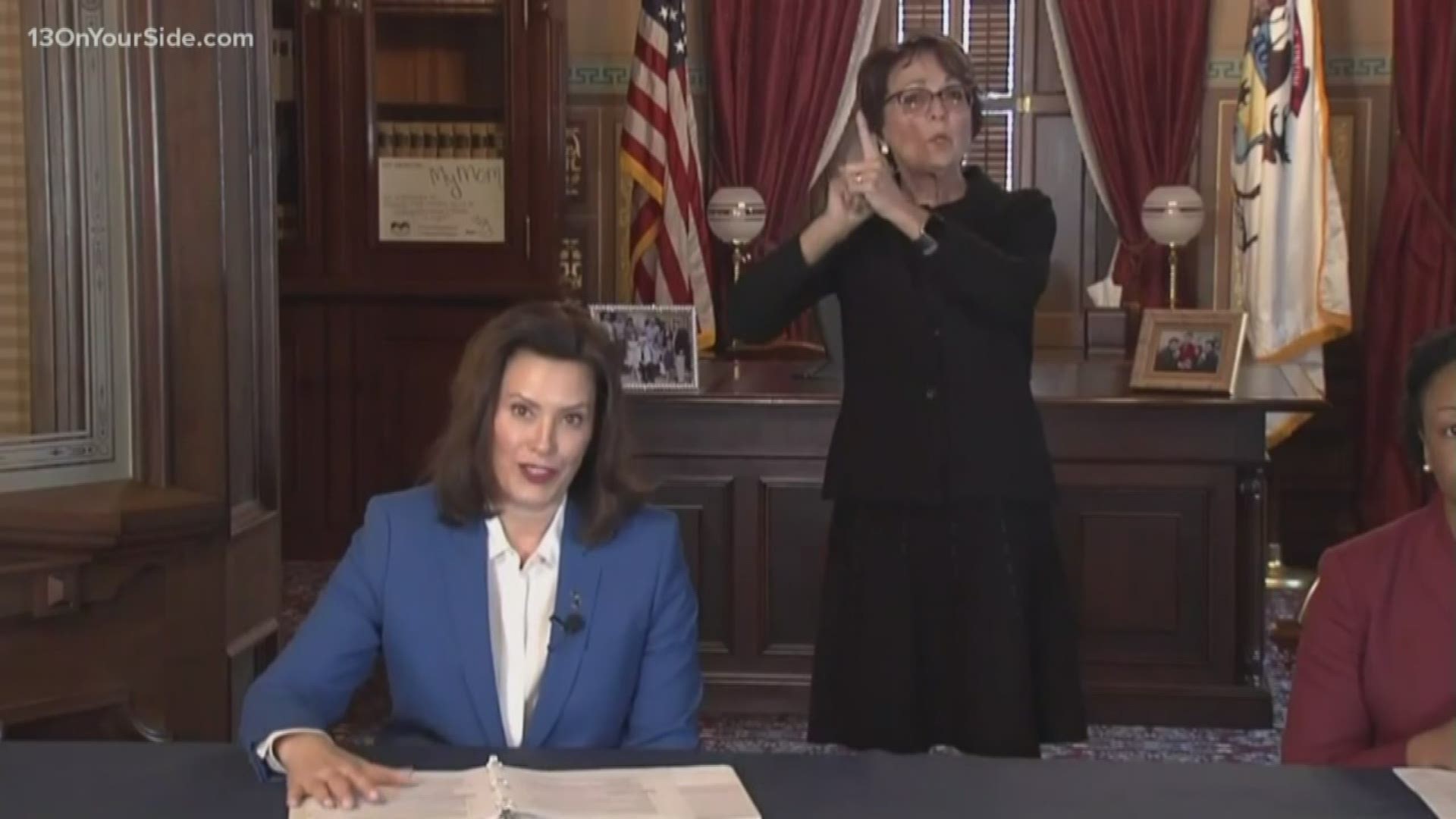LANSING, Mich. — Michigan Gov. Gretchen Whitmer has issued a statewide stay at home order as a way to curb the spread of the coronavirus. The order goes into effect at 12:01 a.m. on Tuesday and will last through April 13.
The sweeping mandate is not a recommendation, Whitmer said at a Monday morning press conference, but an order. However there are exemptions for essential employees and residents will still be allowed to make trips to the grocery store or hospitals or exercise outdoors.
"The goal here is simple: Stay home. Stay safe, save lives," said Whitmer. "I know this is hard. I know this is going to be disruptive. It's certainly going to be hard on our economy as well. But our actions save lives."
Michigan has more than 1,200 cases of COVID-19 and 15 people have died from the virus. The governor and the state's chief medical executive Dr. Joneigh Khaldun both warned that without "aggressive action" the situation will get exponentially worse.
"If we do nothing, very rough models estimate that the number of cases in Michigan could increase five-fold in the next week," said Khaldun. "We are acting right now to decrease that number."
Whitmer also cited some dire models for Michigan's 10 million residents.
"If we stay on our current trajectory, just like Italy, over 70% of our people could get infected with COVID-19. Of that 7 million projected about a million of them would need to be hospitalized. Let me give you a little perspective here. We have about 25,000 acute care beds in Michigan. Think about that," she said.
The stay at home order, also referred to as a shelter-in-place, follows several other states including California, New York, Illinois and Ohio. According to the Johns Hopkins Coronavirus Resource Center, Michigan has the fifth highest number of coronavirus cases in the country.
Both the governor and Khaldun said testing for the virus is still not widely available, even as the state has increased its capacity to running 1,000 tests a day. Because of that, Khaldun said the full scope of the spread of the virus is still unknown to public health officials.
"Please know that even with today's action, the number of cases will go up. Yet today, tomorrow, in the days ahead, it will take some time for us to impact this. We will be continually evaluating the data, the science, the impact on our health. It is going to take greater testing," the governor said.
Whitmer acknowledged that this latest executive order will continue to impact the economy as businesses are forced to close their doors temporarily. But she said the order will save lives.
"We're working to prepare for the long-term economic challenges of this process," Whitmer said. "They will be immense from unemployment to helping our businesses get back up on their feet. Coming back will take time and it won't be easy. We're working with the business community to help Michigan businesses and employers weather this unprecedented crisis."
Several industries are exempt from the executive order, including healthcare, childcare, banks, grocery stores, gas stations and more. Restaurants are also allowed to keep serving food as long as it is takeout only.
Businesses are also asked to limit their staff to only workers who are necessary to maintain minimum operations, but Whitmer still urged companies to take the order seriously.
"If we all do our part, and that means business owners too, don't play fast and loose with what is essential and what's not. Don't try to skirt the rules. If you are not an essential business you need to close," she said.
The governor also indicated that if businesses do not follow the order, she expects to implement fines.
"We're asking, stay home, stay safe, save lives. That's the most important thing that we can all do right now observe these orders," Whitmer said before emphasizing again, "stay home."
STATE RECOMMENDATIONS FOR COVID-19
Patients with confirmed infection have reportedly had mild to severe respiratory illness with symptoms of:
- Fever
- Cough
- Shortness of breath
The best prevention for viruses, such as influenza, the common cold or COVID-19 is to:
- If you think you have been exposed to COVID-19, call your health care provider. If you do not have a health care provider, call the nearest hospital.
- Wash your hands often with soap and warm water for 20 seconds. If not available, use hand sanitizer.
- Avoid touching your eyes, nose, or mouth with unwashed hands.
- Cover your mouth and nose with a tissue or upper sleeve when coughing or sneezing.
- Avoid contact with people who are sick.
- If you are sick, stay home, and avoid contact with others.
- Stay at least 6 feet away from others when in a public setting.
MORE CORONAVIRUS NEWS:
►Make it easy to keep up to date with more stories like this. Download the 13 ON YOUR SIDE app now.Have a news tip?
Email news@13onyourside.com, visit our Facebook page or Twitter. Subscribe to our YouTube channel.

